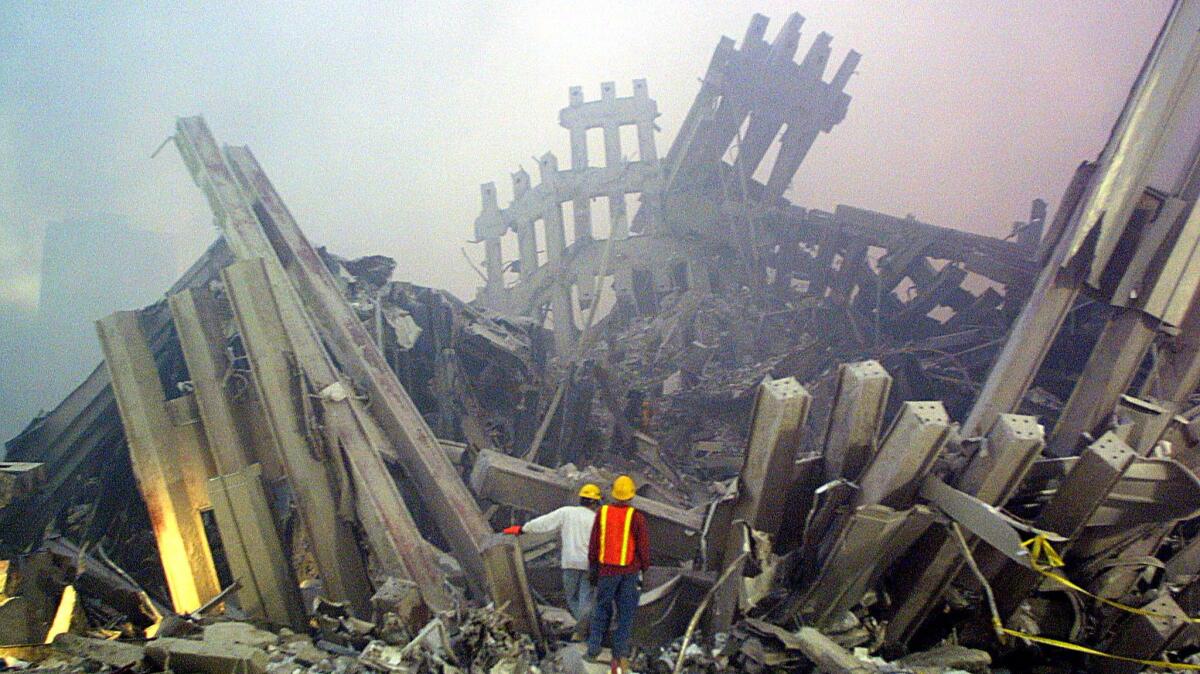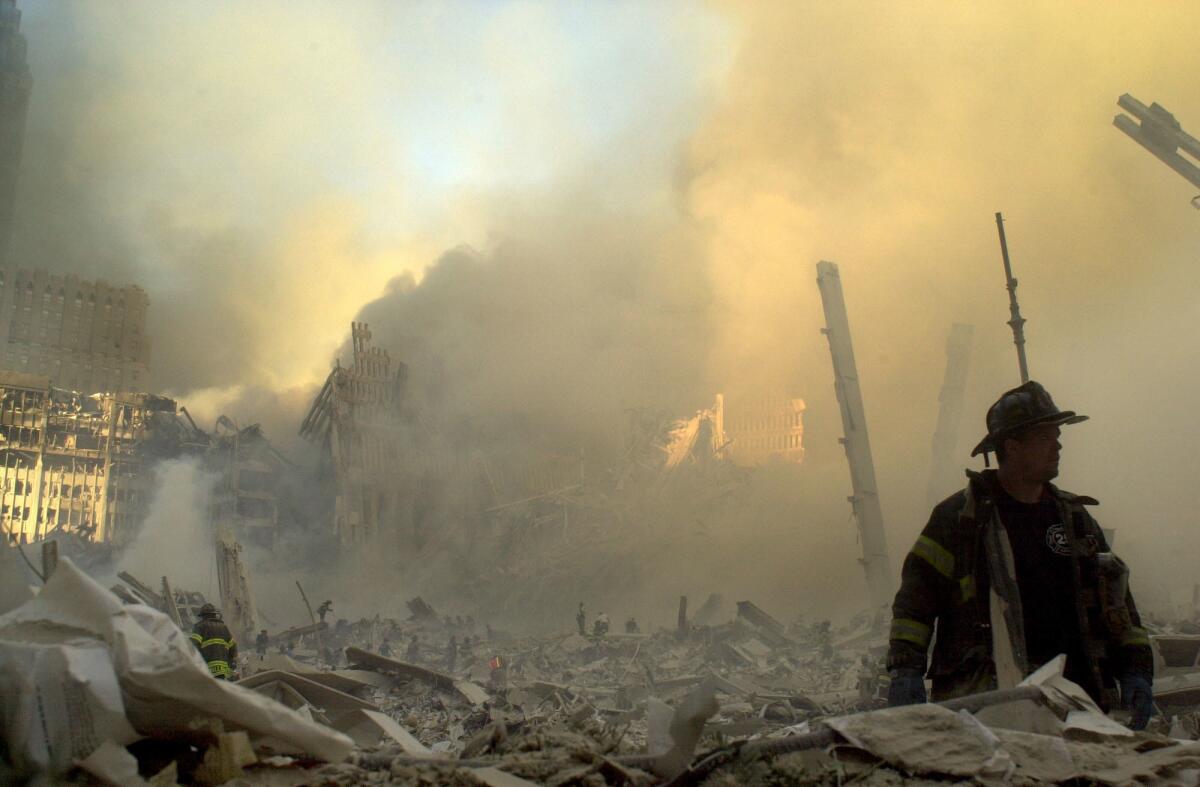15 years later, Sept. 11 responders might be sick and not even know it

- Share via
Reporting from chicago — Making the decision to help 15 years ago might end Garrett Goodwin’s life early.
Goodwin, 39, was one of tens of thousands of people at ground zero right after the Sept. 11, 2001, attacks. A trained medic, he traveled from Tampa, Fla., to New York to volunteer.
But now, his lungs are failing him, and doctors say that will lead to his death. Goodwin is one of many volunteers who spent long hours toiling in the World Trade Center ruins, where toxic fumes have left many sick or dead.
Most of the Sept. 11 responders were from the New York area. But about 9,500 came from elsewhere across the country, according to July statistics from the National Institute for Occupational Safety and Health.
“People really did come from all over,” said Dr. Michael Crane, medical director of the World Trade Center Health Program at Manhattan’s Mount Sinai hospital.
Some of them might not be aware that cancer or a cough, diagnosed by a doctor in Ohio or California, could be connected to that work 15 years ago.
Crane estimates that 90,000 people helped in the area after the attacks. Right now, about 65,000 responders are in the WTC Health Program, run by NIOSH to track and treat them.
“There’s still a good chunk of folks out there who responded to the event and most likely have not been seen by anybody yet,” Crane said.

Federal officials are hoping to reach them.
A continuing public awareness campaign includes a May video with comedian Jon Stewart and a nationwide provider network to connect responders to help wherever they might be.
Their message? Sign up for the program, which provides medical care and monitoring through the James Zadroga 9/11 Health and Compensation Act, named for a detective who became fatally ill after working at ground zero. In December, President Obama signed a law extending funding through 2090.
More than 5,000 people in the program have Sept. 11-related cancer, Crane said. About 40% have a respiratory or gastrointestinal problem. Studies are regularly released monitoring Sept. 11-related health issues.
Goodwin remembers frantically trying to find anyone alive in the smoldering ruins.
“You charge hard, and you don’t quit,” he said. “You try to cover as many voids and spaces and move as much debris and get as deep as you can to try and save people.”
But now, years later, his lungs aren’t working properly.
He said doctors explained to him last September that because of heart and lung issues, they estimate, he has one to seven years to live.
“I’m not even 40 yet,” he said, chuckling, then coughing.
He’s not alone.

Framed by a piece of the World Trade Center towers, annual 9/11 ceremony held in Los Angeles.
John Feal, founder of the FealGood Foundation, which advocates for responders like himself, said he knows many affected by ground zero toxins in various states — but many with symptoms don’t even realize there’s a link.
“Take into effect people from Illinois or other parts of the country that went to ground zero in the early weeks or months and went home and got sick,” he said. “Nobody knew why they got sick.”
About 1,500 registry members live in Florida, where New York police and firefighters often retire.
Doctors have connected a plethora of illnesses, from asthma to debilitating cancers, to the World Trade Center catastrophe. The most common ailments include respiration issues and cancers such as lymphoma and thyroid cancer.
Arthur Noonan got cancer.
He and fellow Chicago firefighters flew to New York days after the attacks. In Manhattan, they joined the line of workers clearing dust and debris on “the pile.”
He remembers the smell of fuel. And the dust.
“It was all pulverized,” he said. “It was like a powder you were digging through, and it would clog the face pieces up almost immediately.”
It’s like living with a hand grenade under your belt.
— Arthur Noonan
He has since been diagnosed with leukemia. In remission, he’s thankful for extra years others did not get and the time to enjoy his eight grandchildren and his children’s weddings.
“It’s like living with a hand grenade under your belt,” he said.
Noonan, like many responders, does not want attention for his illness. He and Goodwin spoke about their experiences in hopes it would prompt other responders to see a doctor.
Even among those who are healthy, cancer is a constant fear.
Mental issues are an enormous, enduring obstacle too. Some who were there still suffer from nightmares or anxiety near a city skyline. Terrorism headlines also are triggers.
According to registry statistics, 1 in 5 responders suffer from post-traumatic stress disorder. About 8% reported binge drinking in the last month.
“These guys were really, really exposed to some horrifying sights,” Crane said, adding that depression rates are similar to those of young war veterans. “It left an impact.”
Doctors continue to prepare for what lies ahead.
Part of that means trying to make it easier to monitor far-flung patients. Crane is thinking of responders who retire elsewhere; video checkups would be less burdensome than a trip to New York for care, for instance.
These guys were really, really exposed to some horrifying sights. It left an impact.
— Dr. Michael Crane
And some illnesses may occur years from now.
For example, ground-zero dust contained asbestos, which can create lung problems and, in some cases, cancer as many as 40 years later, Crane noted. Hence, the importance of monitoring as many people as possible.
Some research will inevitably come too late. More than 50 New York police officers have died from 9/11-related illnesses, and that is more than twice the number (23) who died on Sept. 11.
For Goodwin, life is changing. This summer is his last in his Tampa home — his doctors say the air is too humid for his damaged lungs. He’s focusing on his bucket list and the nonprofit he runs, the American Heroes Foundation.
And for the first time, he’s planning to return to New York, for the 15th anniversary.
He plans to walk the perimeter and stand by the memorial’s waterfalls. And he will pay his respects at a separate memorial for responders who have since died.
“I may not get another opportunity,” he said.
Bowen writes for the Chicago Tribune.
ALSO
A hangar at JFK became a tomb of 9/11. Now nearly empty, its job is done
Congress releases previously secret allegations about Saudi connections to Sept. 11 attacks
More to Read
Sign up for Essential California
The most important California stories and recommendations in your inbox every morning.
You may occasionally receive promotional content from the Los Angeles Times.










